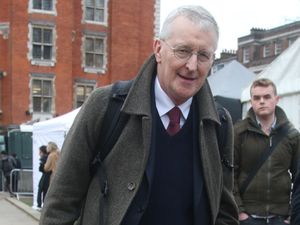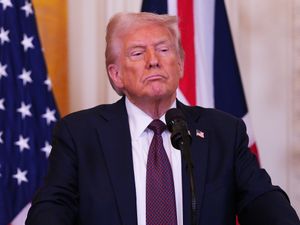Benn ‘wrong to reject brake request’ but Government now acting – Little-Pengelly
The deputy First Minister said the move on the Stormont Brake had forced a change of view in the Government.

The UK Government is acting to prevent a divergence in law between Northern Ireland and Great Britain on packaging and labelling of chemicals, the Stormont deputy First Minister has said.
Emma Little-Pengelly said Northern Ireland Secretary Hilary Benn was “wrong” to reject a Stormont Brake request in a bid to stop the appliance in the region of updated EU rules on packaging and labelling of chemicals.
But she said the move had forced a ‘change of view’ within Government and insisted action is being taken to avoid divergence.
Earlier this week, Mr Benn said the tests had not been met to initiate the oversight mechanism contained in the UK and EU’s deal over post-Brexit trading arrangements.

Unionists in the Northern Ireland Assembly had requested in December that the Government consider applying the brake over the EU amending legislation which will apply to the labelling and packaging of chemicals such as sealants, house cleaning materials or industrial chemicals.
This had required Mr Benn to consider if the legal tests to trigger the mechanism had been met.
The UK Government can apply the brake if it is satisfied the amending legislation would have a “significant impact on the everyday life of communities in Northern Ireland that is liable to persist”.
But Mr Benn wrote to the Speaker of the Northern Ireland Assembly Edwin Poots on Monday to state that he did not believe the legal test had been met.
The NI Secretary pointed out that the labelling requirements for chemicals in Northern Ireland are already different from the rest of the UK, because it is a devolved matter.
Mr Benn also set out a commitment that the Government will take future steps necessary to avoid regulatory barriers between GB and Northern Ireland arising from the legislation.
Speaking in Belfast on Tuesday, Ms Little-Pengelly said every designated unionist in the Assembly had backed the Stormont Brake request.
“We believe that the Secretary of State was wrong to reject that request,” she said.
“That was a request not just made by the DUP but … by every designated unionist in the Assembly but of course we also need to remember that the Stormont Brake is there to prevent that divergence.”
Ms Little-Pengelly said the Stormont Brake could have been pulled previously over dental amalgam rules, but said in that case Government took action at an early stage to prevent divergence between Northern Ireland and GB.
“On this issue, I do welcome the fact that the Secretary of State has indicated that he will deal with any issues of divergence. We will be keeping a very close eye on that. We will be asking the key questions to make sure that that happens,” she said.
“The chemical trade between Great Britain and Northern Ireland is worth over a billion pounds a year so this is not an insignificant issue but of course what we want is the Government to prevent that divergence.
“The Government has now accepted that there is an issue, they have committed to avoiding that divergence, that has only happened because the Stormont Brake was pulled.
“We will be urging the government to take these things seriously at an earlier stage. There was no indication that they did when the government came before the committee.
“I welcome the change of view in the Government. The fact is that only happened because of the Stormont Brake and I welcome the fact that the divergence will be avoided.”
The Windsor Framework require checks and customs paperwork on goods moving from Great Britain into Northern Ireland.

Under the arrangements, which were designed to ensure no hardening of the Irish land border post Brexit, Northern Ireland continues to follow many EU trade and customs rules.
The brake is a mechanism that allows a minimum of 30 Stormont MLAs, from at least two parties, to refer a proposed EU law change to the UK Government.
The Government then makes an assessment of the proposed change on Northern Ireland and can ultimately veto its application in the region.
If the Government had ruled that the brake had been appropriately pulled, it would have directly engaged with the EU to find a solution.
The DUP, backed by other unionists, initiated the oversight mechanism in December.





